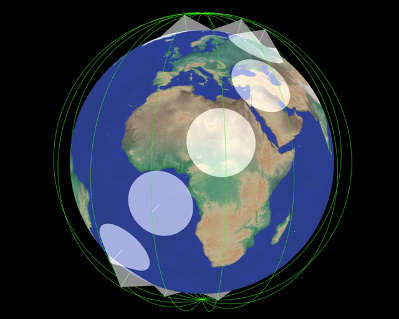Dutch startup to launch satcoms service for Internet of Things
April 2017 – A Dutch start-up supported by ESA  has announced that it has raised €1 million in funding from private investors for a new satellite-based connectivity service targeting the Internet of Things. Magnitude Space, founded in 2016 as the first commercial satellite operator in the Netherlands, is planning to launch a constellation of microsatellites to provide a low-cost global service to collect data from simple, inexpensive monitoring devices with low bandwidth requirements. The company envisages a myriad of uses for the service, such as monitoring precipitation, tracking rail and sea transport, keeping tabs on small fishing vessels, and locating herds of cattle, regardless of location or remoteness.
has announced that it has raised €1 million in funding from private investors for a new satellite-based connectivity service targeting the Internet of Things. Magnitude Space, founded in 2016 as the first commercial satellite operator in the Netherlands, is planning to launch a constellation of microsatellites to provide a low-cost global service to collect data from simple, inexpensive monitoring devices with low bandwidth requirements. The company envisages a myriad of uses for the service, such as monitoring precipitation, tracking rail and sea transport, keeping tabs on small fishing vessels, and locating herds of cattle, regardless of location or remoteness.
The company’s first microsatellite is scheduled for launch at the end of 2017, with the service commencing in early 2018. The constellation will eventually consist of some 48 of the small spacecraft, offering global coverage. ESA has been supporting Magnitude Space through ARTES Entry, a funding programme designed to provide opportunities to small- and medium-sized enterprises (SMEs) which have not worked with ESA in the previous ten years. It offers financial support for up to 75% (maximum €250,000) of the activity cost.
The Dutch government is also supporting the company by officially recognising it as a satellite operator and giving support for an exclusive frequency allocation, which gives Magnitude a competitive advantage.
The company has now embarked on a second funding round, with the target of raising €5 million.
LOW EARTH ORBIT
Magnitude Space’s microsatellite will have a launch mass of 6.5 kgs. The Critical Design Review has been completed and the first flight model is being manufactured by ISiSpace. The spacecraft has an anticipated lifespan of five years in Low Earth Orbit, and will fully comply with international space debris agreements.
“This service will be provided at a fraction of the cost compared to existing satellite IoT services”, says Ernst Peter Hovinga of Magnitude Space. “The majority of applications require message intervals between once a day and once an hour. This can be easily serviced by a relatively small constellation.”
A subscription to the service will cost €3 per year, for one message per day of several hundred bits. A suitable ground terminal will cost on the order of €15 apiece. The company has already lined up a number of customers for the new service, from the agriculture, fisheries and transport sectors, among others.
“Up to now the satellite industry has focused more on broadband Internet connectivity,” Hovinga points out. “High speed services are not efficient or cost effective for low-bandwidth monitoring. As such, we believe we have identified a niche market with tremendous potential.”
“The Magnitude Space team has a tight development schedule,” says ESA’s Frank Zeppenfeldt, Technical Officer for this ARTES Entry activity. “This will allow them to validate their approach very quickly indeed. We designed the ARTES Entry programme especially for ESA newcomers and SMEs, with rapid development cycles backed by a strong entrepreneurial spirit.”



